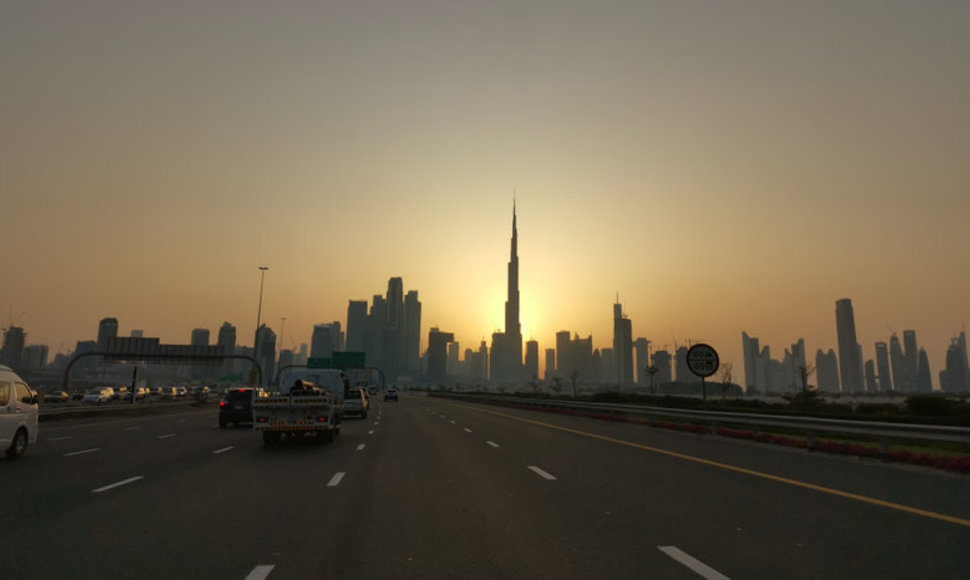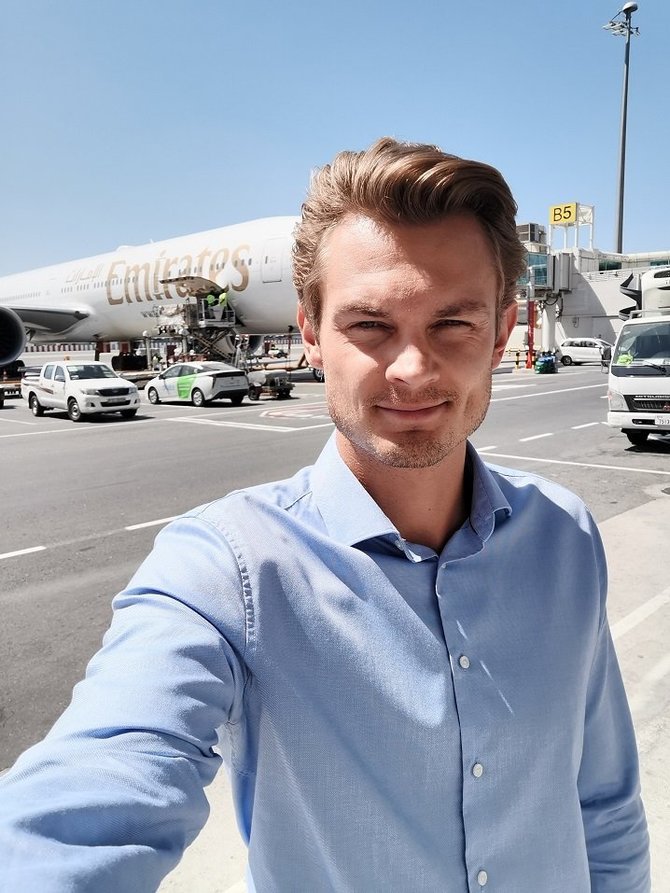"This technological gap is growing on a year-over-year basis, and there are not enough specialists to fill this gap. Historically, with short-term changes, energy prices have been rising in a consistent way, thus the need to address the problems associated with building engineering systems is also increasing. Every day, more and more building managers or developers realize what part of their operating costs goes to building maintenance and, thus, turn to building energy specialists who have got this very specific knowledge”, says Rokas Janulis, a graduate of Vilnius Gediminas Technical University (VGTU), currently working for the company “Dubai Airports”, which is in charge of the operational management, asset maintenance and the development of two international airports.
He tells his story of how the studies chosen at VGTU Faculty of Environmental Engineering which were supposed to successfully promote the take-over of the family business, led him to Denmark and later to exotic Dubai.
Many young people find it difficult to choose a profession or an area they want to relate their future too. Have you always known what you wanted to study? What led you to the choice of building energy?
I fully understand young people and their hesitations, because I myself was in such a situation. Only the "menu" of studies is much more extensive nowadays, and the more "dishes” you have the harder it is to choose. In 2006, it also was not an easy task to make a choice because I wanted to try different areas and activities. After long discussions, I chose the Building Energy Studies offered by VGTU Faculty of Environmental Engineering, because the business that my parents were developing at that time was directly related to this area. You probably wonder if my parents insisted on this choice. The answer is yes, but it was not a decisive argument. I had been following my dad at work since I was a child, going to work meetings with him. At the age of 14, I already started installing air conditioning facilities for my parents’ friends. However, I did not take over my parents' business.
What stands out in your memory from the studies at the university?
Probably, like for most young people, student parties were exceptional events (laughs). Speaking seriously, my career in the chosen area started the other way round, i. e. first I gained practical skills and only then, when I studied at the university, did I acquire theoretical knowledge. Perhaps that’s why most of the study subjects studied then turned out to be interesting and meaningful. Well, perhaps except maths (laughs).
Tell us, please, about your career, professional work?
My career path was a bit atypical, because, as I have mentioned, I started work in this area when I was a teenager. Then, during my bachelor's and master's studies I helped to develop my parents business, worked as a designer, initiated a separate business branch to implement renewable energy technologies in Lithuania. I remember that I had to contribute to the design of one passive house according to the German standard, I did the calculations.
Tell us, please, how you found yourself in Dubai? What are the main activity areas of your company and what does your working day look like?
In fact, I followed my wife to Dubai because she got a job here prior to me. I currently work for the company “Dubai Airports”. The company responsibility areas are the operational management, asset maintenance and development of two international airports. So far, this is the largest organization I have worked for. I work in the Energy Management Office. The key functions of this office include the launch, development and supervision of energy conservation solution projects, development of the long-term energy strategy, implementation of new processes and standards to reduce the airport energy-related operating costs, and support of sustainable development.
As for a typical working day, it is rather difficult to describe because there are no two identical working days. On a daily basis, I have to make telephone calls, write emails, conduct or participate in meetings with other departments, address strategic issues. My responsibilities also include inspection of existing airport systems and shaping them to the most modern technologies and solutions. There is no time for boredom, and those around you always respond in a positive way to knowledge-based opinion.
You graduated from VGTU in Lithuania. What does the quality of Lithuanian studies look like in the international context?
Like any other university in Europe, VGTU has a high evaluation criterion in a global context and the knowledge obtained at this university is highly valued by employers. People living in other countries may not know where this university is. However, they certainly realize that in the West, in European countries diplomas are not given for anything and it takes a lot of effort and time to complete the studies there and get a degree.
In my opinion, this professional area is desperately significant and needed on a global scale. I myself have had to participate in many interviews and collaborate with recruitment agencies and staff professionals in finding specialists in other states because they are simply not available on the local market. Very often, building energy specialists have to be invited from North America, European or Asian countries, where such specialists have strong professional competencies and knowledge in the area, they are aware of the latest methodologies and technological solutions.
Please, tell us why you like the job of an engineer and what the benefits of choosing this path are?
Firstly, the job of an engineer, no matter what field, has always been and will always be highly valued. It is not for nothing that memos such as "Trust me, I'm an engineer” are created. Engineers constantly deal with issues related to daily human activities, the environment, and the results of their work are usually tangible and can be measured.
Everyday activities, i.e. work you are doing, must be pleasant, encourage improvement and increase satisfaction with the results achieved. I would not like to urge school graduates to choose a speciality they are not interested in, but I would like to point out that the knowledge we gain in this area at the university is very necessary and valued both on the local - Lithuanian - and global levels. I can assure you that none of this field specialist will be left without work. And, with the right approach, this field specialists can become world-class coveted experts of their field.













